Holistic Development
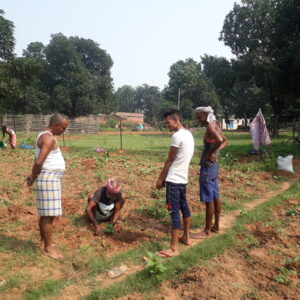
SBI Gram Seva project has been launched in October 2017 by NBJK with 1245 HHs at 10 villages of Jharkhand and Bihar as 05 villages in each state. The program is supported by SBI Foundation, Mumbai under CSR initiative of State Bank of India and activities for holistic rural development are being carried out in the villages namely Ramaldih, Sahari, Gadi, Nawadih and Barsatiya in Andhrigadar panchayat of Deoghar Sadar block of Deoghar district (Jharkhand). Likewise villages as Chhachudih, Garahi, Hethchakai, Patjori and Mamtadih from Ramchandradih panchayat of Chakai block in Jamui district (Bihar) fall under the project which aims for integrated development through education for children as well as skill development, livelihood support, profitable agriculture for youths, women and farmers. The initiative towards digitalization of each village through computer education for children-youths, Community Information Centres with facilities of computers, internet, photo copier machine, printer etc. and community’s access to banking service provide an extra edge to SBI Gram Seva.
Agriculture and Livestock Development

Majority of the population of Jharkhand (about 80%) are dependent on agriculture and forests for their livelihood. With only 8% of the Net Sown Area under irrigation, agriculture is mostly rain-fed. Untimely rainfalls and lack of rain water harvesting structures for irrigation causes serious food security issues in villages. Lack of food security from the land has compelled many families to migrate out of their villages.
The World Food Programme – the Food Aid Organization of UN have recently come out with Food insecurity Atlas of Rural India. 5 classifications for the Jharkhand State are outlined below:
-
Food Availability
Extreme Problem
Food Access
High Problem
Food Insecurity
Extreme Problem
Food Absorption and Utilization
Extreme Problem
Environmental Sustainability
Moderate Problem
The livestock sector contributes 27% of the value of output from agriculture and its allied activities. The demand of goat and pig meat is largely growing in Jharkhand. Already there is a deficit of 40% goat meat and 25% pork in the market.
Promoting new improved ways of agriculture practices, Construction of water harvesting structures, managing NTFP, promoting Pig and Goat rearing and market linkages could help in poverty reduction among marginalised and tribal community of Jharkhand.
Our Approach and Achievements
NBJK is one of the most renowned organisations of Bihar and Jharkhand working for past 45 years towards the alleviating poverty and development of poor and marginalised community of Bihar and Jharkhand. With kind support of SRTT and CInI, NBJK is implementing “Mission 2020: Lakhpati Kisaan-Smart Village” programme with 2500 HHs of 45 villages in Murhu block under Khunti district of Jharkhand to promote sustainable livelihood and food self-reliance to marginalised and tribal poor through improved agricultural practices & allied activities. This aims to defeat poverty with increased life choices and farmers’ income up to Rs. 1, 20,000 annually till the year 2020.
The program works over the themes of Nurturing sustainable self managed institution like women SHGs and their federation to leveraging credit support for families, low cost water structures for more HHs, farm/forest based livelihood with grower clusters and livestock rearing. NBJK acts like a monitoring unit and 174 SHGs promoted under the program are nucleus within livelihood activities.
To increase the income, promotion of Cash Crops cultivation like watermelon, tomato, cabbage, chilli, cauliflower, etc., promotion of Lac Cultivation and promotion of Pig rearing is done. During 2015-16, 1585 HHs have produced 1755.2 tons of tomato, cabbage, watermelon upon 269 acres land with enhanced average annual income of Rs. 60-80 thousand per family. 1450 and 440 HHs involved with Lac production and Piggery could include Rs. 40,000 and Rs. 30,000 annually to their income.
One of the major problems in Jharkhand is of irrigation. To increase land under irrigation, low cost water harvesting structures like ponds, check dams, irrigation wells, etc. have been ensured for 1350 HHs with support of Government programs.
NBJK believes in full community participation. Selection of crops, plots, beneficiaries and monitoring of works are all done by the full community.
Last year NBJK has facilitated villagers of Bari village (Khunti) to draw water of Tajna River through pipe across Sudgiburu hillocks by using gravitational force only. This initiative has bagged 10th Water Digest Water Award for NBJK and declared it as a Winner under the category of Best NGO for Revival of Rural Water Resources by Times Network. This resulted as 24 hours water supply for 60 HHs of the village and round the year irrigation for 200 acres land there.
Still much to do…
- Food security at the home of poor and marginalised is only for 7-8 months in a year
- Over 50% of the population of Bihar and Jharkhand are living below poverty line
- Only 8% of Net Sown Area is under irrigation despite of average annual rainfall of 1300mm
Micro Credit
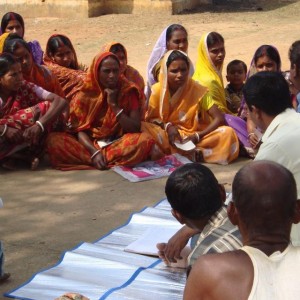
Poverty is the root cause of several problems faced by people in villages and slums. Poverty is like a vicious cycle, one cannot move out of poverty unless external support is provided to break the cycle. Many poor people want to start their business or expand their small business but without capital, they are not able to do it.
NBJK through its micro credit programme, provide small loan those needy who want money for their business. Promotion of women Self Help Groups and their smooth functioning have made it a successful program.
Micro Credit provides easy and door step service to them. These SHG members are more organized now and their awareness level is amazing. NBJK works with 7,051 women in 7 districts of Jharkhand and Bihar. For men, the program facilitates JLGs (Joint Liability Groups).
Through Micro Credit, NBJK has introduced a transparent and people’s friendly monetary system that reduces practices like land/asset mortgage, advance crop selling and above all reinstated the dignity of women with more stakes in home or outside.
What is the need?

Vicious Cycle of Poverty
About 50% and 55% of the population of Jharkhand and Bihar and living Below Poverty Line, earning less that Rs.26 ($0.5) per capita per day. Poverty plays as catalyst to many issues faced by the poor people. They are not able to access better health services, education and livelihood opportunities. This has resulted in high MMR, IMR, malnutrition, migration, trafficking, etc.
Poverty is like a vicious cycle, one cannot move out of poverty unless external support is provided to break the cycle. Many poor people want to start their business or expand their small business but without capital, they are not able to do it.
Our Approach and Achievements
NBJK is one of the most renowned organisations of Bihar and Jharkhand working for past 43 years at the grassroot level. NBJK has been implementing micro credit programme for past 20 years in Hazaribag, Ranchi, Khunti, Ramgarh, Koderma, Pakur and Patna districts of Jharkhand and Bihar.
Self Help Groups and Joint Liability Groups have been formed at village level. Each group does its monthly saving from Rs.50-Rs.100 per month and they use this saving for small internal lending among the group members. When a member of group require amount more than their saving in the group, the group reviews her/his requirement and submits application to NBJK. After reviewing the need and amount, NBJK gives a small loan to the member through the group. Repayment is done by the person in easy instalments. Currently NBJK has a repayment rate of 98%.
10,000 Self Help Groups (SHGs) and 1000 Joint Liability Groups (JLGs) have been formed in over 2000 villages. 60,000 Women and 10,000 men have been organised in these groups. Last year 6196 women and 1223 men were linked with business activities, increasing their income. After contributing financially to the family, their decision making in the family increases. This has increased the social status of women.
Through Micro Credit, NBJK has introduced a transparent and people’s friendly monetary system that reduces practices like land/asset mortgage, advance crop selling and above all reinstated the dignity of women with more stakes in home or outside.
Still much to do…
- Over 50% of people are Below Poverty Line (BPL) in Bihar and Jharkhand states of India
- Poverty is the root cause of several problems faced by people in villages and slums
- Cycle of poverty could only be break if poor are provided with external support for their business
Skill development and livelihood
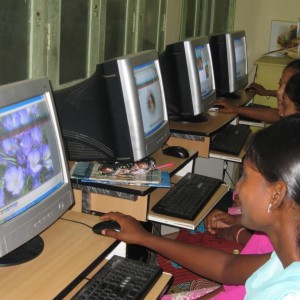
In villages, unskilled youths are forced to migrate for work to bigger cities because of less opportunity in local areas. Many people with disabilities could not earn their livelihood because of less opportunities in the villages. Widow and deserted women are also looked down in the society.
To empower them all, it is necessary that they earn their own livelihood and to provide them with various skills required in an individual to be able to earn in the local market, NBJK with the kind support of Axis Bank Foundation, Stichting Kinderhulp Bodhgaya, UTI Mutual Fund, SBI Life, USHA International Ltd. and Youth 4 Jobs, has started Rozgar Training Centre.
These training centres are at Hazaribag, Koderma, Ramgarh, Ranchi, East Singhbhum, Dhanbad, Giridih, Deoghar, Dumka, Khunti and Gaya districts of Bihar and Jharkhand. Centres provide quality practical learning in streams like basic computer, BPO, bed side patient attendant, mobile phone repairing, housekeeping, beautician, electrician, bike repair, motor driving, agriculture, tailoring etc including spoken English & life skills.
Last year, these centres have trained 6330 youths cumulatively, out of which 3485 are engaged with jobs as per the skills they learnt there. Also 180 youths with disabilities were provided such training and 150 have been placed already. Skill support program on tailoring is being run in villages of 37 districts of Bihar and Jharkhand with help of Usha International Ltd. that involved 492 marginalized rural women to conduct Usha Silai Schools where 1673 girls could complete the foundation course of tailoring at doorstep.
What is the need?
Bihar and Jharkhand are most backward states of India. Climate change results in erratic & uncertain rainfall leading to drought situation every year or alternate year. This forces the youths either to migrate to big cities or to involve in criminal activities or extremist organization.
In Jharkhand, employment in the state stands lowest in the country at 63.8% of main workers to all workers. Conversely, the share of marginal workers (36.2%) is the highest in the country. Of those who are employed, only 4.3% are employed in industrial sector. There is a great risk that unemployed youth may join some criminal/extremist group and may harm the whole nation.
WHO estimates that about 10% of the population has some types of disability with 3-4 % having sever disability. Person with disabilities are most sufferers. They are not easily accepted in the society and over 80% of person with disabilities do not get opportunity to earn.
Similarly, Widow, Deserted Women and Women with Disabilities are looked down in society. It has often been found that they mostly stay at their parent’s home and hardly move out of their house.
To increase the social status of these youths, person with disabilities, widow, deserted women and women with disabilities, it is necessary that they are engaged in some livelihood activities. Therefore, employability training is a most urgent need of the hour.
Our Approach and Achievements
With the aim of providing market led vocational training to rural youths, person with disabilities, widow, deserted women and women with disabilities, NBJK with the kind support of Axis Bank Foundation, Stichting Kinderhulp Bodhgaya, USHA International Ltd. and Youth 4 Jobs, has started Rozgar Training Centre to provide market led vocational trainings.
Youths are getting training on streams like basic computer, bed side patient attendant, mobile phone repairing, housekeeping, BPO, hospitality, bike repair, motor driving, beautician, electrician, tailoring, agriculture etc. including spoken English & life skills training. After training they are facilitated for placement in organised sectors.
Women, Deserted Women and Women with disabilities are being provided training on sewing with the support of USHA International Ltd. After the training they are provided with USHA sewing machine. After learning sewing, they also teach girls/women in their villages.
11 centres have been opened at Hazaribag, Koderma, Ramgarh, Ranchi, Khunti, Giridih, Deoghar, Dumka, Dhanbad, East Singhbhum and Gaya districts of Jharkhand and Bihar. Last year, these centres have trained 6330 youths cumulatively, out of which 3485 are engaged with jobs as per the skills they learnt there.
Tailoring is being run in villages of 37 districts of Bihar and Jharkhand that involved 492 marginalized rural women to conduct Usha Silai Schools where 1673 girls could learn the art of tailoring at doorstep.
Achievements of the projects are:
- Providing Sustainable Livelhood to Youths
- Employability
2. Usha Silai School
Still much to do…
- Out of total population 26.9 million in Jharkhand, the population of youth in Jharkhand is 10.2 million (5.3 male & 4.9 Female) out of which 7.7 million are rural and 2.5 million are urban youth.
- Available formal training capacity of the country- 2.3 million, so there is a gap of 18.7 million. Among persons of age group of 15 years & above only 2% have any technical degree/diploma/certificate
Housing development
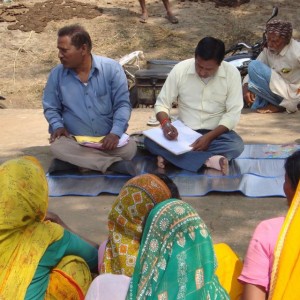
Families and homes are still the first and foremost concern for Indian women. In slum areas where low income group people live with congestion without proper housing facility, lack sanitation and suffer from inadequate financial provisions to lead quality life, NBJK with the kind support of Oak Foundation has intervened through women SHGs facilitated earlier in those areas with a program of housing infrastructure improvement.
Revolving fund is provided to them in order to repair, renovate and expand their houses. Also this ensures proper water supply, toilet facilities and drains for better sanitation.
Last year, 225 households in 10 slums of Ranchi were funded to restore basic amenities for them and women could rejoice this significant contribution they made for their families.
What is the need?
Ranchi is the capital of the newly formed state of Jharkhand. Owing to rapid urbanization in and around the city, large influx of the migrants has been observed, which has resulted in formation of slums.
Slum population by majority is Tribal Population. Most slums lack basic civic amenities like proper roads, drainage, water supply and toilet facilities.
Slum dwellers do not have permanent Housing facilities. They have houses which are made of Mud, Mud tiles with mud flooring and plastic roofed houses. Due to economic constraints they are compelled to live in one room and practice open defecation due to unavailability of latrine facilities.
Every people living in slums want to have housing with minimum facilities for smooth running of their lives. But due to heavy financial crisis they could only concentrate for their bread and every other necessarily remains secondary.
Our Approach and Achievements
NBJK has been running micro credit programme for past 10 years in slums of Ranchi. It is currently working with 100 SHGs and 1000 women from 20 slums of Ranchi.
During visits in the slums, NBJK noticed that a large number of slum dwellers are interested in a loan to renovate/repair/construct their homes. Cost for housing projects of slum dwellers goes from Rs.40,000 – Rs.70,000. Out of this amount, people were ready to contribute Rs.20,000- Rs.30,000.
As from the 43 years’ experience of our organization we are running SHGs at every slums and also providing small loans, but these loan are minimal and only for their economic growth.
NBJK with the kind support of Oak Foundation develop a new product i.e. housing loan for improvement in housing facilities so that slum dwellers could live in good conditions as of every other human being.
Under this project we propose to provide Rs 20,000 to Rs. 40,000 as loan to one beneficiary against their own share of Rs 20,000 to 30,000 in cash or kind. The loan amount is refunded in 20 to 40 equal and easy instalments. A small service charge is charged on the loan amount. Service charges add to the sustainability of the project.
The service charge earned is also used for improvement for drainage, toilets and handpump repairing or installation.
Still much to do…
- Over 50,000 people are living in slums of Ranchi with very poor housing facilities
- About 1000 people die every year due to poor sanitation in slums
Watershed programmes
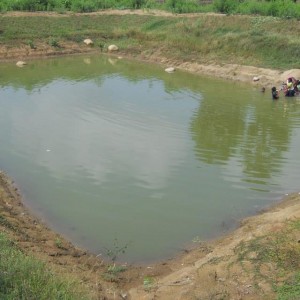
When agriculture is already shrinking and became loss-making in many states of India, our rural community needs support for not only irrigation but a compact model of farming which can enable them to draw variety of benefits through management of local resources collectively in terms of environment preservation, animal husbandry, new products, processing and market linkage.
Watershed Management Program proposes checking the runoff water, protecting soil, increasing cultivatable land & net sown area, increasing income of poor and organising villages through Self Help Groups.
The program is for 40 villages in Koderma and 63 in Dumka districts with support of JSWM-SLNA. Likewise NABARD has supported NBJK to implement Cholkho Watershed project in 6 villages of Markachcho block under Koderma district.
Models have been established on renovation of existing water harvesting facilities and integrating various components of farming together towards sustainability. It has a comprehensive plan to conserve water as a life line, increase income of poorest and the model considers women as a central force to run the program.
What is the need?
Jharkhand state has a total area of 79.70 lakh hectares of land, of which 38 lakh hectares are cultivatable land. The net sown area of the state is 18 lakh hectares (only 25% of the total area), while the net irrigated area is 1.57 lakh hectares (only 8% of the net sown area).
Jharkhand receives about 1300MM of rainfall each year much greater than average annual rainfall of 650MM in Punjab. Even though, over half of districts of Jharkhand were declared a drought 5 times in last 7 years. Some of the reasons being: un-timely rainfall, runoff of rain waters and plateau areas.
Also, there are many new improved was of cultivation where input is very less and yield is high. But most of the farmers are still practicing traditional ways of agriculture because they are not aware of it.
This has resulted reduce in the farming practices of farmers. Many farmers are leaving their fields and migrating to towns in search of jobs, where they are in high risk of exploitation.
Our Approach and Achievements
NBJK has an expertise of 43 years in the field of agriculture and watershed and till date it has provided benefit to over 1 million farmers.
To start watershed management programme, first Entry Point Activities (EPAs) are done. NBJK believes in total participation of the community and thus villagers are involved during the selection, designing and implementation of the activities. After EPAs, a full programme is developed with the help of community.
The programme does not only concentrate on watershed management. Apart from construction of Check Dams, Farm Ponds, Land Bunding, and other watershed management activities, the programme also focuses on capacity building of farmers, improving farming productivity, increasing income of poorest of the poor and organising women through Self Help Groups.
NBJK with the kind support of Jharkhand State Watershed Mission and NABARD was able to cover 15000 hectares of land. Water was made available for additional 1000 hectares of land. 30 Farm Ponds, 30 Wells, 5 Check Dams, 100 Hectare land bunding and 200 hectare of tree plantation was done, providing benefit to 5000 farmers. Last year in Dumka, it could provide 4 water structures for 57 peasants in 5 villages, bunding of 4 hec. land for 2 villages and 300′ lift irrigation facility. Training on SRI cultivation (290 farmers), tailoring (120 adolescent girls) and SHG formation (300 women) was held in Koderma district with renovation (29 wells, 2 ponds), field bunding (4800 mts.), irrigation pipe (20 SHG members) and mango plants with fencing (1441 farmers). Also SRI farming and fishery were popularized in 3 villages in the district.
Still much to do…
- Jharkhand receives over 1300MM of rainfall every year, still many districts are declare drought as most of the water run off
- Only 4% of cultivatable area is under irrigation and rest depends on rainfall. Rainfalls are sometimes untimely causing a huge loss to farmers.
- 85% of population of Jharkhand and Bihar lives in rural areas and mainly depends on agriculture
